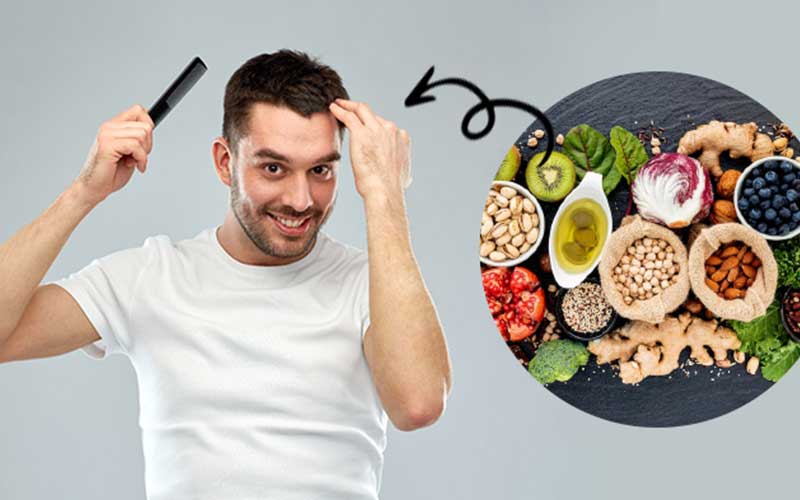Proper Nutrition After Hair Transplant | Essential Dietary Guide for Faster Healing and Stronger Hair Growth

Proper Nutrition After Hair Transplant | Essential Dietary Guide for Faster Healing and Stronger Hair Growth
Introduction
Hair transplant surgery is a modern and effective solution for treating baldness and restoring natural hair. However, the success of this cosmetic procedure doesn’t depend solely on surgical technique—it also heavily relies on post-transplant care, especially nutrition. A proper diet plays a key role in nourishing newly implanted follicles and accelerating scalp healing.
In this article, we share expert nutritional advice from Dr. Mojtaba Mostafazadeh at Sepanta Center, offering a comprehensive guide to what you should eat (and avoid) after your hair transplant to achieve the best results.
Why Is Nutrition Important After a Hair Transplant?
After a hair transplant, your body needs optimal nutrients to rebuild tissue, support new hair growth, and prevent further shedding. Poor nutrition can slow healing and even lead to weak or falling grafts.
According to Dr. Mojtaba Mostafazadeh, choosing the right foods during the recovery period directly affects the strength and health of transplanted hair follicles.
Top Nutrients Your Body Needs After a Hair Transplant
1. Protein – The Building Block of Hair
Hair is made of keratin, a type of protein. Your body needs plenty of protein to help regenerate hair follicles and heal the scalp.
Best sources: Chicken, eggs, lentils, yogurt, fish (especially salmon)
2. Iron – Enhances Blood Flow to the Scalp
Iron helps carry oxygen to hair follicles. A deficiency can cause hair thinning or loss.
Best sources: Liver, spinach, red meat, eggs, fortified cereals
3. Vitamin C – Boosts Iron Absorption and Fights Inflammation
This antioxidant not only supports iron absorption but also reduces inflammation and strengthens the immune system.
Best sources: Oranges, kiwi, bell peppers, strawberries
4. Biotin (Vitamin B7) – Improves Hair Strength and Thickness
Biotin is essential for maintaining healthy hair and scalp after transplantation.
Best sources: Cooked eggs, almonds, bananas, mushrooms
5. Zinc – Aids Tissue Repair and Prevents Hair Shedding
Zinc supports protein synthesis and cell repair, both of which are essential post-transplant.
Best sources: Red meat, eggs, pumpkin seeds, legumes
6. Omega-3 Fatty Acids – Reduces Inflammation and Stimulates Follicles
Omega-3s increase blood flow to the scalp and support the health of transplanted grafts.
Best sources: Fatty fish like salmon, walnuts, flaxseeds
What to Avoid After a Hair Transplant
-
Fried or fatty foods: May cause scalp inflammation and delay healing
-
Alcohol: Thins the blood and increases the risk of bleeding
-
Excessive caffeine: Can disrupt healthy blood circulation
-
Sugar and processed snacks: Hinder tissue recovery and immune function
Sepanta Center’s Personalized Nutrition Programs
At Sepanta Hair Transplant Center, under the expert care of Dr. Mojtaba Mostafazadeh, patients receive custom-tailored post-surgery care—including nutritional plans designed to match individual lifestyles and health conditions. These plans are made to enhance the final outcomes of your hair transplant procedure.
Extra Nutritional Tips for Better Recovery
-
Drink at least 8 glasses of water daily to keep your body hydrated
-
Only take supplements if prescribed by your doctor
-
Avoid weight-loss diets during the first month after transplant
-
Minimize salt intake and avoid fast food
Frequently Asked Questions About Nutrition After Hair Transplant
Do I need supplements after a hair transplant?
In most cases, a balanced diet provides all necessary nutrients. Supplements should only be taken under medical supervision.
Is Vitamin D important too?
Yes. Vitamin D helps stimulate hair follicles and prevent future hair loss.
How important is water intake?
Hydration is crucial. Water helps flush out toxins and accelerates skin and tissue healing.
Conclusion
A healthy, balanced diet is one of the most effective tools for a successful hair transplant and long-lasting results. With the right nutrition, you support the growth of strong, healthy hair and help your scalp recover quickly and completely.
For expert consultation and a personalized nutritional recovery plan, book your session at Sepanta Center with Dr. Mojtaba Mostafazadeh—a trusted leader in modern hair restoration.
